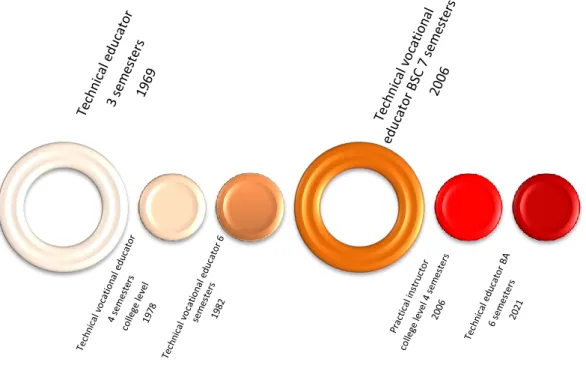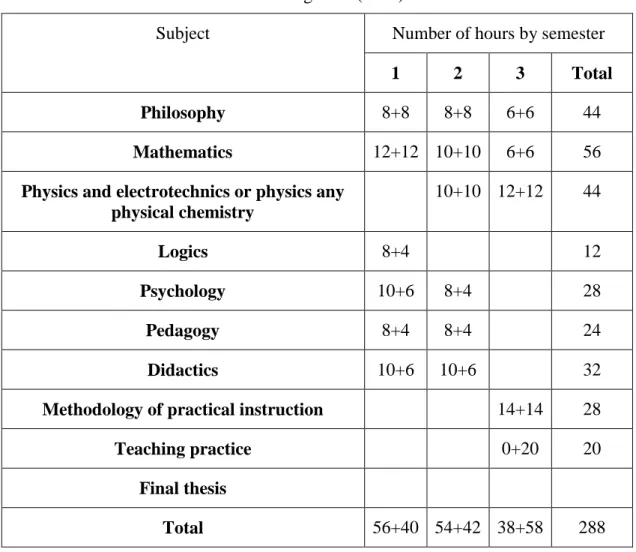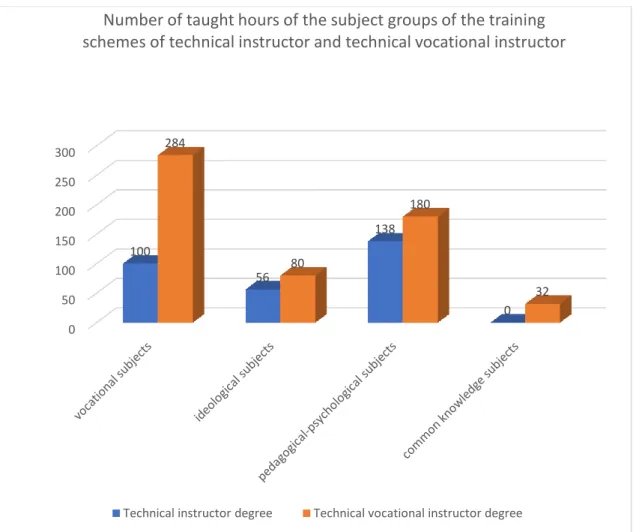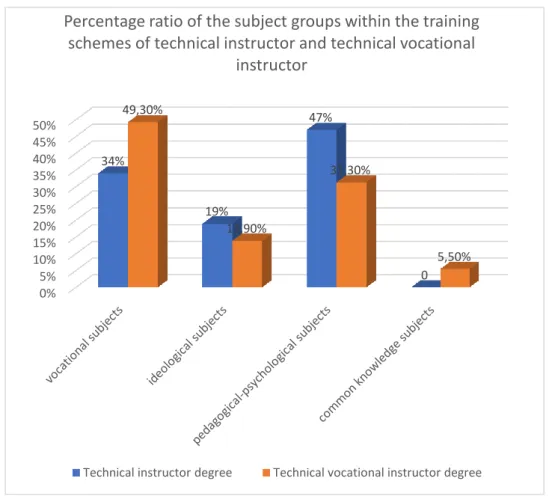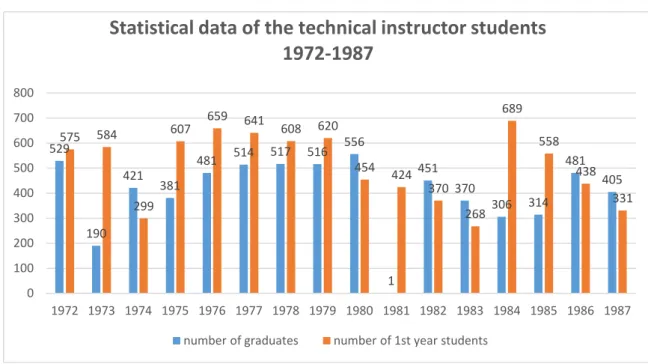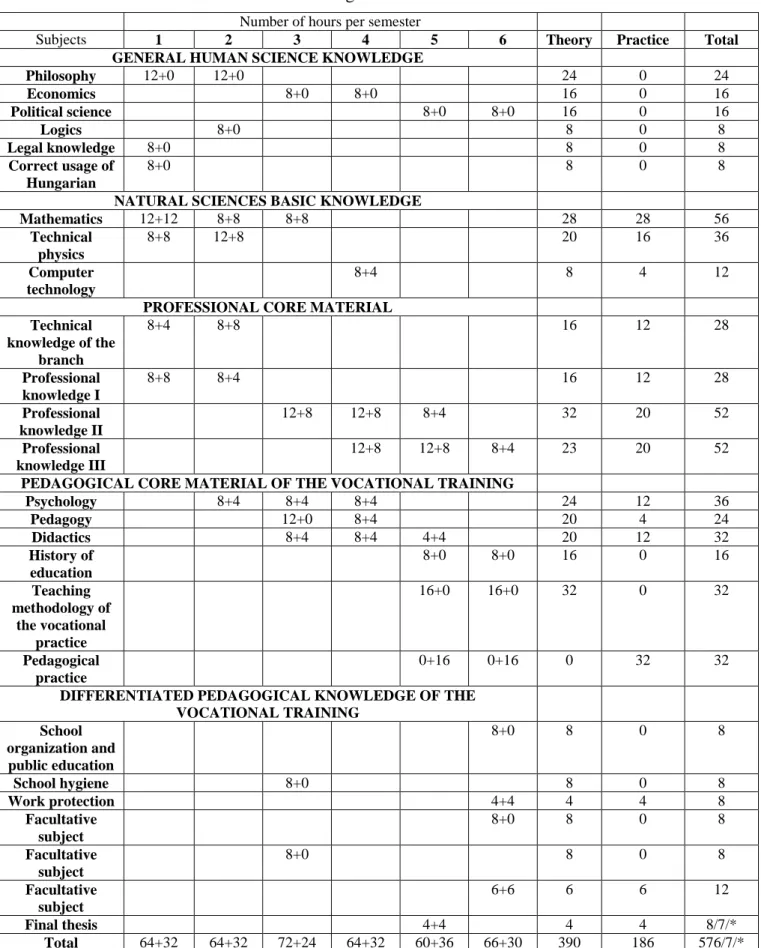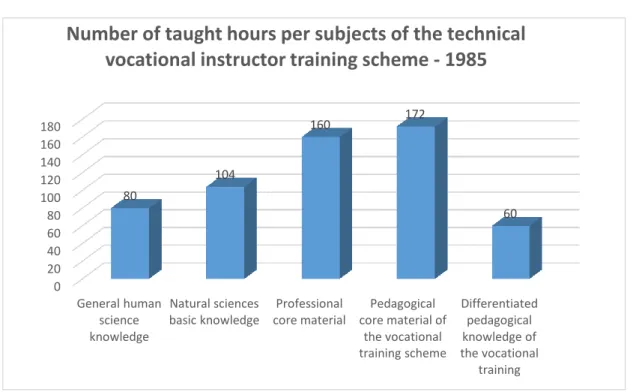Vol. 10, No. 4, 2020 pp. 125-145 https://doi.org/10.24368/jates.v10i4.209 21 125
http://jates.org
Journal of Applied
Technical and Educational Sciences jATES
ISSN 2560-5429
“From technical educators to vocational teachers” I.
Training before the Bologna system
Anetta Bacsa-Bán
University of Dunaújváros, Teacher Training Centre, H - 2400 Dunaújváros, Táncsics Mihály utca 1/A, bana@uniduna.hu
Abstract
The theoretical work presented in the present study strives to limit itself to the historical and curricular aspects of the training of technical instructors. Technical teacher training, which serves the preparation of practical instructors in vocational secondary schools is specific in many respects.
A review of the training of practical instructors can be organised along 6 main central points within the technical teacher training. The most important aspect of the analysis was the examination of training content, training structure and professional-pedagogical ratios based on curriculum frameworks. In addition, it is essential to determine that this training was created in order to meet which vocational training needs and which were the problematic points that served the further development. The training of technical instructors is being done in very few institutions currently, besides the training places, the number of students is also small. One of the main objectives of the theoretical analysis is to outline possible solutions and paths for the future and possible directions of the training, in addition to exploring the problems.
Keywords: vocational instructor; Technical instructor; technical teacher training
Introduction
Technical educators: engineer-teachers, formerly technical teachers, technical vocational teachers; technician-teachers, vocational instructors and vocational teachers are a significant group of the community of teachers. Although this large group is quite numerous, it is increasingly characterised by ageing as well the reduction in number due to the decrease of the replacement i.e. of new members.
At the same time, within vocational training, more than half of students are following technical studies, i.e. about the number of pupils in secondary schools.
According to this, the training of teachers for these technical secondary schools must be proportionally approaching the importance of teacher training for grammar schools. The sentence itself comes from 1988, while its data express the current proportions (Pomázi - Tóth. 1988), showing the timeliness of the problem.
Within teacher training, the training of vocational teachers has been characterized by a varied training structure for a long time due to diversity and the multitude of orientations, yet vocational teacher training is a unified and independent branch of teacher training. The vocational teacher training centres that train teachers for the teaching of vocational theoretical and practical subjects within technician training, vocational grammar schools, vocational secondary schools and vocational schools are in fewer and fewer numbers and are meeting a decreasing trend of newly enrolling students, even though the need of the sphere has not decreased in recent years, only the conditions have changed. The shortcomings of this trade have such a size that the legal framework (Vocational Training Act, 2020) provides for the possibility to use engineer-teachers, technical instructors, etc. without a pedagogical qualification in teaching work. The Vocational Training Act, 2020 only writes about teachers, not teachers with pedagogical qualification in these institutions of vocational training. These declared principles are doubtful as to whether they will only give the opportunity to overcome the deficit, or whether they will determine the training opportunities and long-term market relevance of these majors, professions, professional educators.
In order to find opportunities for development in vocational teacher training and to set out its directions, it is essential to reveal the roots and history of the training. (Zsolt Szövényi:
History of the training of professional teachers in Hungary, 1945-1988. OKI, Budapest 1991.) Within vocational teacher training, both the professional teacher training and vocational instructor training have maintained the duality of the requirements of "professionalism" and
"teaching", as well as the expectation of professional knowledge as a prerequisite for the obtaining of the qualification of teacher and the exercise of the teacher’s activity. (Rádli, 2011)
Another peculiarity of vocational teacher training is that the professional, disciplinary preparedness, together with a teacher’s qualification prepares for the teaching of several subjects. This is present at all levels of vocational teacher training, equally in vocational teacher training as well as in the training of vocational instructors, since it fits with the
structure of the profession, and the vocational training is followed by the training as a whole.
(Rádli, 2011)
From the professional teacher group, the history of research and training in the field of engineer-teachers has been well explored, presented, from the beginning of the training to the current situation of the training, while the training of the vocational instructors is less researched and described.
My present study and the study published in the next issue of the journal aims to confer on the historical and curricular aspects of the training of technical instructors and technical vocational instructors. While the first study aims to explore the first major development curve of the training of vocational instructors/practical instructors before the Bologna system, the next study seeks to explore the changes occurred due to the Bologna system and the current state of the career of this training line.
In the history and also in the present of vocational teacher training, the teaching of professional theoretical subjects and the training of practical instructors is separated. The demarcation follows the internal proportions of vocational training in the first place, which is completed with the professional requirements.
The technical instructor training, which serves to prepare practical instructors for vocational secondary schools, differs in many respects from the training of technical teachers. (Pomázi - Tóth, 1988)
The beginnings of the training
The history and the training antecedents of the training of engineer-teachers, technical teachers and technician-teachers (the terminology of the 1960s is the technician-teacher – the training was then discontinued) is nearly 150 years old, and its roots date back to the Technical University’s vocational teacher training. In addition, however, many technical teachers work in vocational training: thousands of workshop instructors conducting the vocational practice. (Orosz Lajos, 1991) For their pedagogical training, as Orosz puts it, the first "modest" steps were taken in 1967. In this year, a two-year pedagogical correspondence course for industrial vocational instructors was established at the Budapest Teacher Training Institute. (Művelődési Közlöny, 1967. 342-343.)
Fig. 1: Milestones in the evolution of the majors technical educator – technical vocational educator
This training was carried out for qualified skilled worker vocational educators who did not have a secondary school qualification, on the basis of the designation of the supervisory authorities of vocational training schools. During the training, the following subjects and areas of knowledge were taught:
- bases of Marxist philosophy,
- generally psychology, developmental psychology and labour psychology, - pedagogy (theory of teaching and education),
- mathematics, - physics,
- mother tongue (Hungarian) knowledge, - vocational teaching methodology, - pedagogical practice.
They were able to train 100 students a year, who participated in 5-5 hour consultations twice a week in groups of 25 people. Pedagogical exercises were carried out in vocational training schools designated by the Ministry of Culture. After a successful final exam, they received a
“training course certificate of vocational educator”. (Orosz, 1991)
2.1. Technical educator 1969
In 1969, the Conference of the Ministry of Culture also decided to decentralize and extend the training of technical teachers. There were two reasons for this: one was to provide continuous care for vocational training, while the other was to find a solution for the pedagogical training of workshop instructors. (Orosz, 1991) Namely, while the supply of vocational instructors for agricultural, economic and commercial secondary vocational schools is ensured, this has not been resolved in the case of vocational instructors at industrial vocational secondary schools.
The Pedagogical Department of the Budapest Technical University provides, even in only a restricted proportion, training for teachers of technical theoretical subjects, but there is no institution for the pedagogical training of practical instructors at the time. The scale of the needs was also known: around 160 theoretical and 200 practical instructors had to be trained each year. This idea led to the development of the technical teacher training scheme, which, in addition to the degree-based engineering teacher training organised at BTU, i.e. at university level, solved the college-level training of technical teachers in 7 technical colleges /college faculties (including the legal predecessor of the University of Dunaújváros: the NME KFFFK). (Orosz, 1991) These new pedagogical departments had to solve the pedagogical training of workshop instructors. The new, so-called technical instructor training department started with three semesters of study time in a correspondence form.
The entrance requirement of the technical instructor degree training was a secondary technical or vocational secondary school degree (or grammar school baccalaureate and vocational worker certificate), which was linked to the mandatory minimum of two years of workshop teaching practice. (Orosz, 1991)
According to the Regulation of the Ministry of Culture No 3/1972 (IV.27), “in designated technical higher education institutions, technical teachers shall be trained for the teaching of the professional theoretical subject matter in vocational secondary schools and vocational skilled worker-training institutions, and technical instructors for the teaching of vocational practical subjects”.
In the framework of the 3-semester training, they studied ideological and pedagogical subjects, and processed mainly the educational methodology of practical drills appropriate to their professions: mainly in the form of manual or mechanical cutting, high-voltage electrical industrial, communication engineering, chemical industrial, light industrial or other construction industrial practices. The 96-hour (4*3 working days) direct sessions in the
semester also provided an opportunity to repeat and modestly expand the secondary school material of mathematics and physics (or chemistry). The candidates also wrote a final thesis on pedagogy and methodology. Anyway, the technical instructor diploma awarded after the final exam was not college-like degree, i.e. it did not meet the college or today's BSc level. At the same time, the training fulfilled a huge gap, and this is well evidenced by the fact that, as a result of the work of teacher training institutes and pedagogical departments, about 4000 students had obtained this type of "diploma" by 1980. (Orosz, 1991, p. 33)
Table 1: Curriculum of the training scheme of technical instructor – correspondence training form (1972)
Subject Number of hours by semester
1 2 3 Total
Philosophy 8+8 8+8 6+6 44
Mathematics 12+12 10+10 6+6 56
Physics and electrotechnics or physics any physical chemistry
10+10 12+12 44
Logics 8+4 12
Psychology 10+6 8+4 28
Pedagogy 8+4 8+4 24
Didactics 10+6 10+6 32
Methodology of practical instruction 14+14 28
Teaching practice 0+20 20
Final thesis
Total 56+40 54+42 38+58 288
Source: Magyar, 1985.
The subjects of the state examination were selected from among the Pedagogy, Didactics and Methodology of practical instruction.
The proportional distribution of the subject structure is the following:
- Pedagogical subjects 132 hours 47%
- Ideological subjects 56 hours 19%
- Subjects of public knowledge 100 hours 34%
- Totally: 288 hours 100%
Picture 1: Sample of a diploma
One of the aims of the establishment of the degree was therefore to equip teachers without pedagogical qualifications, detaining only secondary level professional preparedness, with both pedagogical and professional knowledge in the course of the training, i.e. the professional and pedagogical quality of practical training should raise in secondary vocational education. From the beginning of the training, the priority role and importance of practical education in vocational training were considered, both in terms of training and education processes. At the same time, the initially very short training period of one and a half year, the
necessarily correspondence system of education, the very problematic lack of theoretical bases essential for the transmission of professional and methodological knowledge, and the heterogeneity of the basic qualification of the admitted students made it very difficult to prepare the instructors to the right standard. But it had also to be taken into account that those working in the profession of vocational instructor, and those applying for this vocational training were well acquainted with the basic trades at the level of skills and knowledge to apply, but their shortcomings were mostly extremely large concerning the general and professional culture, which is essential for the transfer of these and for the pedagogical activity. These conditions and conditions had to be counterbalanced during the initial period of education. (Horn, 1991, p. 134)
Within the extremely limited time frames, the disciplines that form a professional and pedagogical view and also develop general culture have also been given great weight.
Accordingly, the curriculum has been developed in terms of number of lessons, teaching methodology and teaching practical occupations. (Horn, 1991)
2.2. Training of technical educators 6 semesters
At the end of the 1970s, the training of technical instructors was further developed, the duration of which was mostly insufficient for the three semesters, an issue that was regularly on the agenda at the meetings of the OOT (National Board of Education) from 1976 onwards.
In 1976, the possibility of a two-years full-time training was also raised. On the recommendation of the Ministry of Education, in June 1978, the OOT increased study time from September 1978 to 4 semesters and college level. In 1980, the OOT had already reported on the preparation of curricula, the subject programmes and the establishment of the order of the entrance exams for the 4-semester correspondence courses; and it was also proposed to increase the study time to 6 semesters because 4-semester courses cannot ensure a college level of education. Finally, the revised 6-semester college-level training was ordered by the Minister of Culture in the order MM No. 8/1982. (Orosz, 1991)
2.3. College-level training of technical vocational educators
The training was done at the Budapest Technical University (BME), at the Heavy Industrial Technical University of Miskolc (NME) an at the designated technical colleges within the following groups of professions:
- mechanical industry,
- industry of transport, - chemical industry and - light industry.
For the training of technical vocational instructors were able to apply those who had vocational secondary school or secondary technician qualifications, or a grammar school baccalaureate and a skilled worker's certificate, as well as at least two years of teaching or vocational training practice. (Magyar, 1985, 56)
The subjects of the required entrance exam are: mathematics and correct usage of Hungarian (written examination), as well as pedagogical and professional knowledge (oral examination).
In addition, 3 semesters of additional training in mechanical engineering, transport, chemical and light industry trade groups were organized for those who had previously received vocational instructor diplomas. (Magyar, 1985, 58) This additional training was available to technical instructors who, in accordance with § 3 of Regulation (MM) No 3/972, had a degree equivalent to a teacher training institute diploma and were engaged in vocational teaching activities. Those who have completed their studies in the framework of additional training with a successful state examination will receive a diploma of vocational educator with a bachelor's degree.
The technical instructors who participated in the additional training received all the knowledge they had not previously learned or did not learn in such detail, but the curriculum of the new vocational trainers at college level included, for example, ethics, computer science, new professional and pedagogical subjects and work safety.
.
Table 2: Number and percentage of the teaching hours per groups of subjects Professional subjects 152 hours 52.8%
Ideological subjects 40 hours 13.8%
Pedagogical subjects 72 hours 25.1%
Common knowledge subjects
24 hours 8.3%
Total 288 hours 100%
Pictures 2-4: Copy of the registration book of a student who took part in an additional technical vocational instructor training scheme at the NME-KFFK
The new curriculum and the related subject programs prescribed the processing of ideological, pedagogical, psychological and methodological study materials at college level.
In 45% of the training period, students acquired technical, mathematical and physical/chemical knowledge. In addition, they had to prepare a thesis on a pedagogical or methodological subject. (Orosz, 1991)
One of the reasons for the creation of the 6-semester training was the insufficient entry knowledge of the applicants for admission, at the same time, in the case of candidates for the changed training, the trainers had to face also the high lack of general culture at the majority of applicants. They highlighted mostly shortcomings in their mathematical knowledge and spelling skills, which made it difficult for them to cope with the other knowledge requirements of the entrance exam or admission. And the trainers saw only an aggravation of the situation in the low efficiency of the correspondence form of education.
The effectiveness and social usefulness of the training is demonstrated by nothing more than the fact that between 1972 and 1987 the training institutions issued 6 433 technical instructor diplomas, but at the same time 1 444 engineer-teacher degrees and 4 314 technical teacher degrees were awarded, i.e. almost half of the technical teacher training during this period was represented by the training of technical instructors. This number is even significant out of 13,512 technical teachers graduated between 1964 and 1987.
Picture 5: Copy of a technical vocational instructor’s degree
In the elapsed period, vocational training has improved in terms of education, but also in terms of its professional and pedagogical content, and has become new and more modern in its content and structure.
The change is most striking in professional subjects. While mathematics, physics and electrotechnics were the subjects of professional theory in the 1970s, in the new curriculum the teaching for 6 semesters of the subject called vocational knowledge and the introduction of several subjects of common knowledge show the large-scale development in the training of practical instructors. (Magyar, 1985)
Figure 2: Number of taught hours of the subject groups within the training schemes of technical instructor and technical vocational instructor
Source: Magyar, 1985., 64.
0 50 100 150 200 250 300
100
56
138
0 284
80
180
32
Number of taught hours of the subject groups of the training schemes of technical instructor and technical vocational instructor
Technical instructor degree Technical vocational instructor degree
Figure 3: Percentage ratio of the subject groups within the training schemes of technical instructor and technical vocational instructor
Source: Magyar, 1985., 64.
Table 3: Curriculum of the technical vocational instructor degree – Correspondence teaching form (1985)
Number of hours per semesters
Subjects I. II. III. IV: V. VI. Total
Philosophy 12+0 12+0 24+0
Political economics 8+0 8+0 16+0
Scientific socialism 8+0 8+0 16+0
History of the Hungarian workers’ movement
8+0 8+0
Logics 8+0 8+0
Ethics 8+0 8+0
Civic education and legal knowledge
8+0 8+0
0%
5%
10%
15%
20%
25%
30%
35%
40%
45%
50%
34%
19%
47%
0 49,30%
13,90%
31,30%
5,50%
Percentage ratio of the subject groups within the training schemes of technical instructor and technical vocational
instructor
Technical instructor degree Technical vocational instructor degree
Mathematics 12+12 8+8 8+8 28+28
Technical physics 8+8 12+8 20+16
Introduction into computer technology
8+4 8+4
Technical knowledge of the branch
8+4 8+8 16+12
Technical knowledge I 8+8 8+4 16+12
Technical knowledge II 12+8 12+8 8+4 32+20
Technical knowledge III 12+8 12+8 8+4 32+20
Psychology 8+4 8+4 8+4 24+12
Pedagogy 12+0 8+4 20+4
Didactics 8+4 8+4 4+4 20+12
Policy of school management and public
education
8+0 8+0
History of education 8+0 8+0 16+0
Teaching methodology of vocational practice
12+4 12+4 24+8
Pedagogical practice 0+16 0+16 0+32
Correct usage of Hungarian
8+0 8+0
School hygienics 8+0 8+0
Work protection 4+4 4+4
Facultative subject* 6+6 6+6
Final thesis 4+4 4+4
Total 64+32 64+32 72+24 64+32 56+40 62+34 382+194
* It is mandatory to choose a subject from among the following: current issues of technology, pedagogy, professional and pedagogical issues of production practices in the factory, ergonomical basic knowledge, the use of educational technical literature in vocational training, computer science, industrial history.
Source: Orosz, 1991. Attachment 1. pp 50-51
Figure 4: Statistical data of the technical instructor students Source: Orosz, 1991. Attachment 1. pp 50-51
The technical vocational instructor degree basic training course was operating as a 3-year college bachelor's degree until the creation of the 7-semester technical vocational instructor BSc in accordance with the Bologna Process. As a college degree course, its basic goal has always been to contribute to raising the standard of secondary vocational training. To this end, it should pedagogically and professionally prepare the students to lead practical training in vocational secondary schools, skilled worker training schools and vocational schools.
The subjects of this degree course are included in 5 groups:
- General human science knowledge (philosophy, economics, pedagogy, logics, law, correct usage of Hungarian) – 14%
- Natural sciences basic knowledge (mathematics, technical physics, computer science) – 18%
- Professional core material (technical knowledge of the branch) – 28%
- Pedagogical core material of the vocational training scheme (psychology, pedagogy, didactics, history of education, vocational practice, teaching methodology, pedagogical practice) – 30%
- Differentiated pedagogical knowledge of the vocational training (school organization and public education, school hygiene, work protection, facultative subjects, final thesis) – 10%
529
190
421 381
481 514 517 516 556
1 451
370
306 314 481
405 575 584
299
607 659 641
608 620
454 424 370
268 689
558 438
331
1972 1973 1974 1975 1976 1977 1978 1979 1980 1981 1982 1983 1984 1985 1986 1987 0
100 200 300 400 500 600 700 800
Statistical data of the technical instructor students 1972-1987
number of graduates number of 1st year students
Table 4: Number of teaching hours per subjects of the technical vocational instructor degree course – 1985
Number of hours per semester
Subjects 1 2 3 4 5 6 Theory Practice Total
GENERAL HUMAN SCIENCE KNOWLEDGE
Philosophy 12+0 12+0 24 0 24
Economics 8+0 8+0 16 0 16
Political science 8+0 8+0 16 0 16
Logics 8+0 8 0 8
Legal knowledge 8+0 8 0 8
Correct usage of Hungarian
8+0 8 0 8
NATURAL SCIENCES BASIC KNOWLEDGE
Mathematics 12+12 8+8 8+8 28 28 56
Technical physics
8+8 12+8 20 16 36
Computer technology
8+4 8 4 12
PROFESSIONAL CORE MATERIAL Technical
knowledge of the branch
8+4 8+8 16 12 28
Professional knowledge I
8+8 8+4 16 12 28
Professional knowledge II
12+8 12+8 8+4 32 20 52
Professional knowledge III
12+8 12+8 8+4 23 20 52
PEDAGOGICAL CORE MATERIAL OF THE VOCATIONAL TRAINING
Psychology 8+4 8+4 8+4 24 12 36
Pedagogy 12+0 8+4 20 4 24
Didactics 8+4 8+4 4+4 20 12 32
History of education
8+0 8+0 16 0 16
Teaching methodology of
the vocational practice
16+0 16+0 32 0 32
Pedagogical practice
0+16 0+16 0 32 32
DIFFERENTIATED PEDAGOGICAL KNOWLEDGE OF THE VOCATIONAL TRAINING
School organization and
public education
8+0 8 0 8
School hygiene 8+0 8 0 8
Work protection 4+4 4 4 8
Facultative subject
8+0 8 0 8
Facultative subject
8+0 8 0 8
Facultative subject
6+6 6 6 12
Final thesis 4+4 4 4 8/7/*
Total 64+32 64+32 72+24 64+32 60+36 66+30 390 186 576/7/*
Figure 5: Number of taught hours per subjects of the technical vocational instructor training scheme – 1985
Source: Magyar, 1985., 64.
The diagram clearly shows what the focus points of the training have become, due to the shift towards the technical training area, and the weight of the pedagogical areas has decreased significantly compared to the previous vocational training curriculum.
Instead of epilogue
Part of the Hungarian educational history is the history and the whole of technical teacher training. At the same time, it didn't show up in the discipline for a very long time. Besides teacher training teaching public knowledge subjects, the publications connected with technical teacher training and vocational teacher training were overshadowed or completely absent.
Technical teacher training has been on the agenda from time to time in recent decades.
Initially, the justification of the raison d'être of the training was the primary consideration in line with the range of teacher trainings in public knowledge, and then the acceptance of its levels and tasks, both by the scientific and the teaching society. However, as a result of the evolution of the situation of vocational training, it has become increasingly important whether there is a real replacement education in the field, since leaving the teaching career, besides teachers teaching natural sciences subjects is the most important here (Bacsa-Bán, 2019).
General human science knowledge
Natural sciences basic knowledge
Professional core material
Pedagogical core material of
the vocational training scheme
Differentiated pedagogical knowledge of the vocational
training 0
20 40 60 80 100 120 140 160 180
80
104
160 172
60
Number of taught hours per subjects of the technical
vocational instructor training scheme - 1985
Although the fact that the content and structural development of vocational training, which makes up almost 70% of secondary education, was formulated in the mid-1980s, the quality of the training depends decisively on the teachers of professional theory and practice.
As a result of this review, we are entitled to ask the following questions:
- If there are two types of teachers in the vocational training, why cannot we find the place of practical instructors?
- What degree and level of training and what field of training would be suitable for the trainers of the vocational practice?
- Is full-time bachelor's training or correspondence supplemental training more appropriate for the training of vocational instructors and the mobility of a professional teacher?
- Without teaching qualification, how can the teaching engineer or technician meet the task of vocational education and training?
- Is vocational teacher training uniform if the trainers work in different institutions, with often different professional content, organizations and traditions? At the same time, the subject structure is similar everywhere and training for pedagogical work to be performed in secondary educational institutions is mostly carried out. The unit of vocational teacher training is based on the fulfilment of the functions of teacher training.
If we look at the past, the quantitative and structural changes in vocational training and vocational education and their impact determine the training of engineer-teachers, technician- teachers, economic vocational teachers and the vocational instructors.
Nowadays, professional training and retraining are prioritised by the following:
- the economic and social changes;
- the established, functioning and expectable education system, the institutional system of public education, adult education and vocational training;
- structural changes in vocational training, vocational education and training and their impact on the training of vocational teachers;
- the structure of higher education, and within this, the place, function and proportion of teacher training, of vocational teacher training. (Rádli, 2011.)
Similarly, within the vocational teacher training, the proportions of forms of training and professional skills are also affected by the following:
- the structure of the society and economy;
- the structure of the profession;
- system and size of the vocational training;
- correct prognostication of current needs.
During the training of the instructors of the practice – the vocational instructors – all these aspects are further brought to the forefront today and in the continuation of our present study, in the history of the specialization after the Bologna system, we can see the effectiveness of these strong aspects, following the designation of the future path of the training scheme.
Bibliography
Dr. Bacsa-Bán Anetta (2019): A szakmai pedagógusok (pedagógusi)pálya elhagyásának vizsgálata, több dimenzióban II. [Assessment in several dimensions of the (teacher’s) career leaving o the vocational teachers] OPUS ET EDUCATIO: MUNKA ÉS NEVELÉS 6:2 pp 252-269. Paper: http:// dx doi org/10.3311/ope.312.13 p. (2019a)
Dr Bacsa-Bán Anetta (2019): A szakmai pedagógusok (pedagógusi)pálya elhagyásának vizsgálata, több dimenzióban II. [Assessment in several dimensions of the (teacher’s) career leaving o the vocational teachers] OPUS ET EDUCATIO: MUNKA ÉS NEVELÉS 6:3 pp 351-371. 21 p. (2019b)
Fekete József (1985): Mérnöktanár, műszaki tanár [Engineer-teacher, technical teacher]
Szakképzési Szeme 3. 15-22.
Horn Miklós (1991): Szaktanár- és szakoktatóképzés a Kereskedelmi és Vendéglátóipari Főiskolán [Training of vocational teachers and vocational instructors at the College of Commerce and Catering] in Szövényi Zsolt: A szakmai pedagógusok képzésének története Magyarországon 1945-1988. [History of vocational teacher training in Hungary 1945-1988], OKI, Budapest, 133-156.
Magyar Erzsébet (1985): A hazai műszaki pedagógusképzés története (1945-1985), doktori értekezés [History of the domestic technical teacher training (1945-1985), PhD thesis], Szeged.
Orosz Lajos (2003): A magyarországi ipari, mezőgazdasági és kereskedelmi szakoktatás vázlatos története [Brief history of the industrial, agricultural and commercial vocational teacher training], OPKM, Budapest.
Orosz Lajos (1991): A műszaki pedagógusok képzésének története [History of technical teacher training] in Szövényi Zsolt: A szakmai pedagógusok képzésének története Magyarországon 1945-1988. [History of vocational teacher training in Hungary 1945-1988], OKI, Budapest, 9-54.
Pomázi Lajos - Tóth Béláné (1988): A műszaki pedagógusképzés néhány alapkérdése [Basic questions of the technical teacher training], Szakképzési Szemle, 4. 17-24. p.
Rádli Katalin (2011): Szakmai tanárképzés és oktatáspolitika [Vocational teacher training and educational policy] in Szakmai tanárképzés: múlt – jelen – jövő [Vocational teacher training: past – present – future], NFKK Füzetek 7., Aula Kiadó, Budapest.
Szövényi Zsolt (1991): Előszó [Foreword] in Szövényi Zsolt: A szakmai pedagógusok képzésének története Magyarországon 1945-1988. [History of vocational teacher training in Hungary 1945-1988], OKI, Budapest, 5-7.
Legal orders:
A művelődési miniszter 3/1965. (VI. 4.) MM számú rendelete a műszaki tanárok és technikus-tanárok képzéséről. [Order No 3/1965. (VI. 4.) MM of the Minister of Culture on the training of technical teachers and technical instructors]
A művelődési miniszter 3/1972. (IV. 27.) MM számú rendelete a műszaki tanárok és műszaki oktatók képzéséről. [Order No 3/1972. (VI. 27.) MM of the Minister of Culture on the training of technical teachers and technical instructors]
A művelődési miniszter 8/1982. (VI. 1.) MM számú rendelete a műszaki és gazdasági tanárok, valamint a műszaki és gazdasági szakoktatók képzéséről. [Order No 8/1982. (VI. 1.) MM of the Minister of Culture on the training of technical teachers and technical instructors]
157/1996. (XII. 22.) Korm. rendelet a műszaki felsőoktatás alapképzési szakjainak képesítési követelményeiről. [Government Order No 157/1996. (XII. 22.) Korm. on the qualification requirements of the basic training schemes of the higher technical training]
111/1997. (VI. 27.) Korm. rendelet a tanári képesítés követelményéről. [Government Order No 111/1997. (VI. 27.) Korm. on the qualification requirements of the basic training schemes of the higher technical training]
12/2020. (II. 7.) Korm. rendelet a szakképzésről szóló törvény végrehajtásáról [Government Order No 12/2020. (II. 7.) Korm. on the execution of the Act on vocational training]
Short professional biography
Dr. Anetta Bacsa-Bán is the general director of the Teacher Training Centre of the University of Dunaújváros, in the rank of Associate Professor. She studied sociology and then Hungarian language and literature at the Faculty of Human Sciences of the University of Miskolc. He obtained his degree in science from the Doctoral School of Educational Sciences of ELTE-PPK in the field of educational sciences. His research area: student tracking, suitability tests and vocational teacher training, as well as vocational training. As head of research for many projects, she has gained experience in higher education research. Her publications cover all the areas with which the vocational teacher training and the problem of higher education can be approached to sociologists over the past decade and a half.
